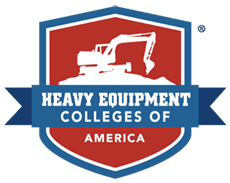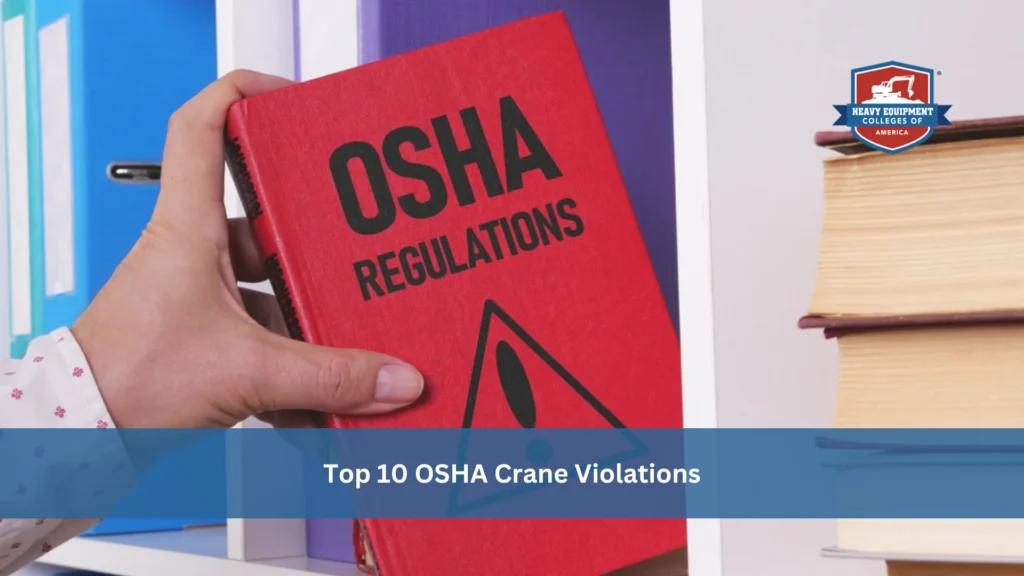Table of Contents
The Occupational Safety and Health Administration (OSHA) enforces strict safety standards to reduce injuries, fatalities, and property damage involving cranes and other heavy equipment. These regulations, outlined under 29 CFR 1926 Subpart CC, establish requirements for crane operation, inspection, and site safety.
Despite clear guidance, crane-related violations continue to rank among OSHA’s most frequently cited safety issues. Many of these violations stem from preventable gaps such as incomplete inspections, unqualified personnel, and missing documentation.
At Heavy Equipment Colleges of America (HEC), we want to make sure crane operators have the proper training and knowledge to keep themselves and others safe on a job site. Our guide outlines the top 10 OSHA crane violations, explains why they occur, and highlights practical steps organizations can take to improve crane safety and regulatory compliance.

The Role of Crane Safety on Construction Sites
Job sites utilize cranes every day to transport materials and equipment efficiently. If crane safety requirements are overlooked, the consequences can be severe. OSHA data consistently shows that crane-related incidents often result in serious injuries, fatalities, project delays, and costly enforcement actions.
Crane safety extends beyond the operator. OSHA also places responsibility on employers to ensure that equipment is properly inspected, workers are qualified, and job sites are prepared to support safe lifting operations. Effective crane safety programs focus on planning, communication, and verification rather than reaction after an incident occurs.
Start Your Crane Operator Career With Confidence
Kickstart Your Crane Operator Journey Today!
Hands-On Training | OSHA-Compliant Courses | Job-Ready Skills
Become a Certified Tower Crane Operator Today!
Start Enrollment ProcessFind The Right Location For YouThe Top 10 OSHA Crane Violations
Below are the most frequently cited OSHA crane violations, based on enforcement trends and industry safety reporting:
1. Failure to Perform Required Inspections
OSHA requires cranes to undergo multiple types of inspections. One of the most common OSHA violations is when inspections are not performed as required or when documentation is missing or incomplete.
Inspectors frequently cite employers for failing to maintain written records that confirm inspections were conducted by a qualified individual. Even when equipment appears to be in good condition, the absence of proper documentation can result in a citation.
2. Unqualified Signal Persons and Riggers
Signal persons and riggers play a vital role in crane operations, particularly when operators do not have a clear view of the load. OSHA requires that these individuals be qualified through evaluation, training, or certification.
Violations often occur when employers assign signaling or rigging duties to workers without verifying that they meet OSHA’s qualification criteria. A lack of qualifications increases the risk of miscommunication, dropped loads, and struck-by incidents.
3. Improper Documentation of Qualifications
Even when workers are properly trained, OSHA requires that qualification documentation be available on site. This includes records showing how signal persons were evaluated, what types of signals they are qualified to use, and who conducted the assessment.
Citations are commonly issued if this documentation isn’t present during an inspection. OSHA considers incomplete or inaccessible records a compliance failure, regardless of actual worker competency.
4. Inadequate Operator Qualification or Certification
Crane operators must be qualified and, in many cases, certified in accordance with OSHA standards. Employers are also responsible for evaluating operators to confirm they can safely operate the specific equipment used on the job.
OSHA frequently cites employers when operators lack valid certification, operate equipment outside their certification scope, or have not been formally evaluated. These violations highlight the importance of ongoing assessments, not just initial credentials.
5. Failure to Keep Clear of Loads and Fall Zones
OSHA regulations prohibit employees from standing or walking beneath suspended loads or within designated fall zones unless their presence is essential to the operation. These requirements are outlined under §1926.1425, which focuses on protecting workers from struck-by and caught-between hazards.
If a job site fails to clearly mark fall zones or allows workers to remain near suspended loads, OSHA considers this a serious safety failure, especially during lifting operations involving heavy or unstable loads.
6. Poor Rigging Practices
Improper rigging is a leading cause of dropped loads and crane-related incidents. OSHA requires that rigging activities be performed by qualified personnel who understand load weight, balance, sling selection, and secure attachment methods.
Citations are commonly issued when damaged rigging equipment is used, load limits are exceeded, or unqualified workers perform rigging tasks. Even minor rigging errors can result in catastrophic outcomes, making this a consistent enforcement focus for OSHA inspectors.
7. Lack of Load-Rated Equipment or Load Capacity Awareness
OSHA mandates that cranes and lifting accessories be clearly marked with their rated load capacities. Employers must ensure that operators and lift planners understand and follow manufacturer load charts at all times.
Using equipment beyond its rated capacity or ignoring these ratings is an OSHA crane violation, as it significantly increases the risk of structural failure or crane tip-overs.
8. Failure to Follow Assembly and Disassembly Procedures
Crane assembly and disassembly present some of the highest-risk conditions on job sites. OSHA requires employers to follow manufacturer procedures and ensure that assembly and disassembly activities are supervised.
Citations frequently happen when steps are skipped, procedures are improvised, or workers lack proper oversight. These violations underscore the importance of planning and supervision during all phases of crane setup and removal.
9. Electrical Contact and Electrocution Hazards
Contact with overhead power lines remains one of the leading causes of crane-related fatalities. OSHA requires minimum clearance distances between cranes and energized lines, along with additional protective measures when working near electrical hazards.
Failing to identify power lines or properly train operators and ground crew on electrical hazard safety is considered an OSHA violation. OSHA treats these violations as particularly serious due to the high risk of fatal outcomes.
10. Inadequate Worker Access and Ground Stability Issues
Safe crane operation depends on stable ground conditions and secure access points for workers. OSHA citations are common when cranes are set up on uneven, soft, or improperly prepared surfaces, or when workers lack safe access to crane components.
Ground failures and unsafe access conditions can lead to tip-overs, structural damage, and worker injuries. OSHA expects employers to evaluate site conditions and address stability concerns before lifting begins.

Proactive Strategies to Avoid OSHA Crane Violations
Avoiding OSHA crane violations requires a proactive, systematic approach to workplace safety. Organizations that consistently meet OSHA standards focus on identifying risks early, training personnel effectively, and maintaining robust compliance oversight.
Rather than reacting to incidents, these employers integrate safety into daily operations and long-term planning. Key strategies for reducing OSHA crane violations include:
- Conducting Regular Risk Assessments: Routine evaluations help identify potential hazards such as fall risks, unstable ground conditions, electrical exposures, and load-handling concerns before they lead to violations or incidents.
- Providing Comprehensive Safety Training: Ongoing training ensures that crane operators, riggers, signal persons, and ground crews understand proper procedures and updated OSHA regulations.
- Strengthening Compliance Preparedness: Assigning compliance officers, maintaining accurate documentation, and organizing internal safety audits help ensure readiness for OSHA inspections.
- Responding Promptly to Incidents: OSHA requires that employers report serious workplace injuries. Prompt response, thorough documentation, and corrective actions help prevent recurrence and demonstrate a commitment to workplace safety.
- Conducting Safety Audits and Encouraging Employee Feedback: Regular safety audits help identify areas for improvement, while encouraging employees to report hazards fosters a safety-first culture.
- Investing in Safety Technologies: Advanced safety tools such as debris nets, wearable monitoring technology, and automated hazard detection systems can reduce exposure to risks and improve overall job site safety.
- Leveraging Expert Guidance: Expert guidance helps organizations stay current with evolving safety standards and best practices. Partnering with industry safety specialists can provide customized support for risk management and OSHA compliance.
FAQs
What is the most common OSHA crane violation?
Failure to perform or properly document required crane inspections is among the most frequently cited OSHA crane violations. Missing records can result in citations even when equipment appears to be in good working condition.
Who is responsible for crane safety compliance on a job site?
OSHA places responsibility for crane safety compliance on employers. This includes ensuring proper training, equipment inspections, documentation, and enforcement of safety procedures.
What happens if OSHA identifies a crane violation?
If OSHA identifies a crane violation, employers may face citations, fines, and required corrective actions. Serious violations can also lead to project delays and increased scrutiny during future inspections.
Become a Certified Crane Operator with Heavy Equipment Colleges of America
Meeting OSHA crane safety requirements starts with proper education and hands-on training. At Heavy Equipment Colleges of America (HEC), we offer structured crane operator programs designed to prepare students for certification, regulatory compliance, and real-world job site expectations.
Through a combination of classroom instruction and practical training, students gain a working understanding of OSHA crane standards, equipment operation, inspection procedures, and safety planning.
Our crane programs include:
Ready to take the next step to becoming a crane operator? Apply online today to get started!
Build a Strong Future in Heavy Equipment Operation
Train to Operate Tower Cranes Safely and Confidently
Real-World Experience | Expert Instructors | Career-Focused Training
Enroll in Our Crane Operator Program Today!
Start Enrollment ProcessFind The Right Location For You
